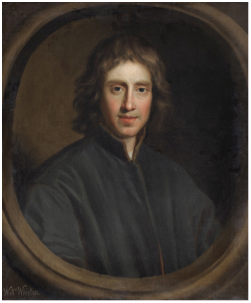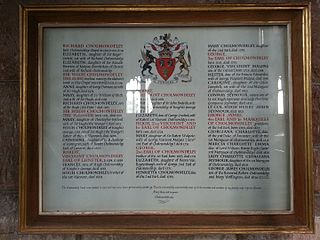Life
He was born in London in April 1697. His father was a merchant in Lambeth, who died when his son was in his third year. He received his education at Kensington. He was admitted a commoner of Wadham College, Oxford on 12 April 1712, where he was subsequently elected a scholar. He graduated B.A. in 1715, and M.A. 13 June 1718. In July 1719 he was transferred to Hart Hall, and soon afterwards took holy orders. In 1722 he was chosen fellow of Dulwich College. He was a favourite with John Robinson, the bishop of London, with whom he resided for about two years. On the resignation of Joseph Butler, Bolton became preacher at the Rolls Chapel in London, 1729, on the nomination of Sir Joseph Jekyll. [1]

Lambeth is a district in Central London, England, in the London Borough of Lambeth. It is situated 1 mile (1.6 km) south of Charing Cross. The population of the London Borough of Lambeth was 303,086 in 2011. The area experienced some slight growth in the medieval period as part of the manor of Lambeth Palace. By the Victorian era the area had seen significant development as London expanded, with dense industrial, commercial and residential buildings located adjacent to one another. The changes brought by World War II altered much of the fabric of Lambeth. Subsequent development in the late 20th and early 21st centuries has seen an increase in the number of high-rise buildings. The area is home to the International Maritime Organization.

Kensington is a district in the Royal Borough of Kensington and Chelsea, West London, England.

Wadham College is one of the constituent colleges of the University of Oxford in the United Kingdom. It is located in the centre of Oxford, at the intersection of Broad Street and Parks Road.
As fellow of Dulwich College, Bolton took up residence there on 10 March 1722, but resigned his fellowship on 1 May 1725. He then moved to Kensington, depending mainly on his personal fortune, and became close to William Whiston, from he had introductions to both Jekyll and Lord Hardwicke. Bolton was preferred to the deanery of Carlisle, and admitted 1 February 1735. Later (1738) he was instituted vicar of St. Mary's, Reading. He held both benefices together for life, and was non-resident in his deanery. He raised some money to add to poor livings in the diocese of Carlisle. [1]

William Whiston was an English theologian, historian, and mathematician, a leading figure in the popularisation of the ideas of Isaac Newton. He is now probably best known for helping to instigate the Longitude Act in 1714 and his important translations of the Antiquities of the Jews and other works by Josephus. He was a prominent exponent of Arianism and wrote A New Theory of the Earth.

The Diocese of Carlisle was created in 1133 by Henry I out of part of the Diocese of Durham, although many people of Celtic descent in the area looked to Glasgow for spiritual leadership. The first bishop was Æthelwold, who was the king's confessor and became prior of the Augustinian priory at Nostell in Yorkshire. Carlisle was thus the only cathedral in England to be run by Augustinians instead of Benedictines. This only lasted until the reign of Henry III however, when the Augustinians in Carlisle joined the rebels who temporarily handed the city over to Scotland and elected their own bishop. When the revolt was ended, the Augustinians were expelled.
Bolton died in London on 26 November 1763, having come to town to consult Dr. Anthony Addington. He was buried in the church-porch of St. Mary's, Reading. [1]

Anthony Addington was an English physician.
This page is based on this
Wikipedia article Text is available under the
CC BY-SA 4.0 license; additional terms may apply.
Images, videos and audio are available under their respective licenses.

Robert Bolton was an English clergyman and academic, noted as a preacher.

George Cholmondeley, 2nd Earl of Cholmondeley, PC, FRS, styled The Honourable from birth until 1715 and then known as Lord Newborough to 1725, was an English soldier. Cholmondeley was the second son of Robert Cholmondeley, 1st Viscount Cholmondeley, and Elizabeth Cradock. Hugh Cholmondeley, 1st Earl of Cholmondeley, was his elder brother. He was educated at Westminster School and Christ Church, Oxford. Cholmondeley supported the claim of William of Orange and Mary to the English throne and after their accession he was appointed a Groom of the Bedchamber.

Samuel Bradford was an English churchman and whig, bishop successively of Carlisle and Rochester.
Edmund Bunny (1540–1619) was an Anglican churchman of Calvinist views.

Harvey Goodwin was a Cambridge academic and Anglican bishop, Bishop of Carlisle from 1869 until his death.
Joseph Burroughs was an English Baptist minister.

Sir James Burrough was an English academic, antiquary, and amateur architect. He was Master of Gonville and Caius College, Cambridge, and designed or refaced several of buildings at Cambridge University in a Classical style.

Edward Boys (1599–1667) was an English divine.
Edward Gee (1657–1730) was an English churchman, known as a controversialist, and later successively Dean of Peterborough and Dean of Lincoln.
John Blair FRS, FSA, was a British clergyman, and chronologist.
Samuel Harris (1682–1733) was an English clergyman and academic, the first professor of modern history at the University of Cambridge.
William Thomas Bullock (1818–1879) was an English Anglican cleric and mission administrator.
Edmund Castle (1698–1750) was an English churchman and academic, Master of Corpus Christi College, Cambridge from 1745, and Dean of Hereford in 1749.
Ambrose Dawson (1707–1794) was an English physician.
James Charles Booth was a leading English conveyancer.
John Dalton (1709–1763) was an English cleric and poet. He is now remembered as a librettist.
John Bonar, the elder (1722–1761) was a Scottish minister.
Henry Blunt (1794–1843) was an evangelical cleric of the Church of England. He introduced an early parish magazine, Poor Churchman's Evening Companion, in his London parish of Chelsea.

Theophilus Lobb (1678–1763) was an English physician, known as a medical and as a religious writer.
Isaac Gosset the younger (1745–1812) was an English bibliographer, elected a Fellow of the Royal Society on 18 June 1772.














